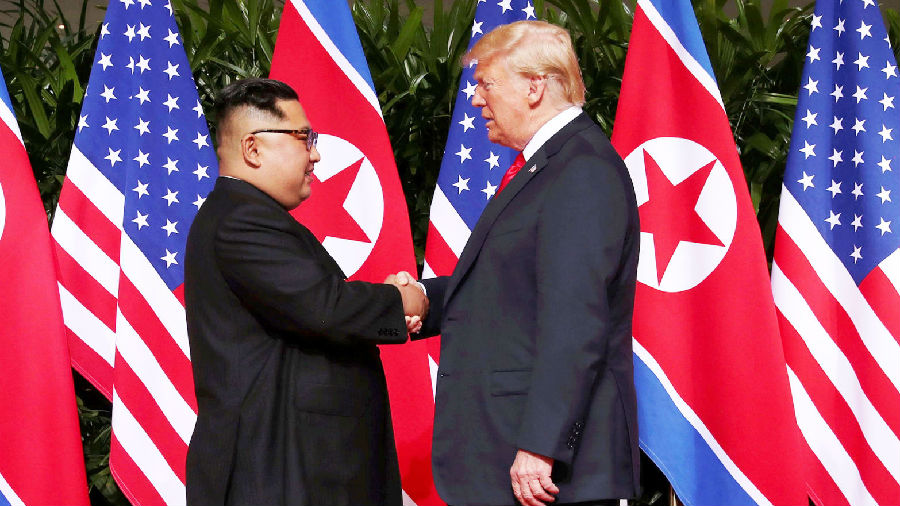Washington points to historic examples of countries willingly and openly standing down their nuclear programs: South Africa after it democratized and Ukraine after the dissolution of the Soviet Union. If you do that, the U.S. has told the North, the money will begin to flow.
美國指出,一些國家愿意并公開地放棄其核項目,這是具有歷史意義的例子:南非是在解體后,烏克蘭是在蘇聯(lián)解體后。美國告訴朝鮮,如果這樣做,資金就會開始流動。
That position ignores the extraordinary level of mistrust between the Kim regime and the U.S., say current and former diplomats who have dealt with Pyongyang. Consider what the North means when it talks about denuclearizing the Korean Peninsula. Yes, it wants the South removed from the U.S. nuclear umbrella—the air and seaborne weapons standing ready to defend Seoul and other East Asian allies—but its sights go much further. U.S. diplomats and intelligence officials have learned to their chagrin that the North Korean government apparently believes—incorrectly—that the U.S. still maintains a secret stash of nuclear weapons in the South. In a December 20 statement, Pyongyang said the U.S. “must study geography.” The Korean Peninsula, it said, “includes the territory of our republic and also the entire region of South Korea where the United States has placed its invasive force, including nuclear weapons.”

和朝鮮政府打過交道的前任和現(xiàn)任外交官都表示,這一立場忽視了金氏政權與美國之間極不尋常的不信任。考慮一下朝鮮在談論朝鮮半島無核化時的意思。是的,朝鮮想讓韓國從美國的核保護傘中消失——隨時準備保衛(wèi)首爾和其他東亞盟友的空中和海上武器——但朝鮮眼光遠非如此。令美國外交官和情報官員懊惱的是,朝鮮政府顯然認為美國仍在韓國秘密藏匿核武器——這是錯誤的。朝鮮政府在12月20日的聲明中說,美國“必須學習地理”。 聲明表示,朝鮮半島“包括我們共和國的領土,也包括美國部署包括核武器在內(nèi)的入侵力量的整個韓國地區(qū)”。
The U.S. removed all tactical nukes from the South in the early 1990s, but the North’s claim is in line with domestic propaganda the North uses to demonize the U.S. Pyongyang claims America started the Korean War in 1950 by invading the North; in fact, Kim Il Sung, Kim Jong Un’s grandfather, invaded the South. It says the U.S. seeks to keep Korea permanently divided and stands poised to attack the North at any moment. The standard assumption among many foreign policy analysts is that the leadership simply uses these claims to justify its own spending on the military in the face of widespread poverty.
上世紀90年代初,美國從韓國撤走了所有戰(zhàn)術核武器,但朝鮮的說法與朝鮮用來妖魔化美國的國內(nèi)宣傳相符。朝鮮政府方面聲稱,美國在1950年入侵朝鮮,引發(fā)了朝鮮戰(zhàn)爭;事實上,金正恩的祖父金日成入侵了韓國。聲明稱,美國試圖使朝鮮永久分裂,隨時準備攻擊朝鮮。許多外交政策分析人士的標準假設是,面對普遍存在的貧困,朝鮮領導層只是用這些說法來為自己的軍費開支辯護。
But that doesn’t mean that in private discussions with outsiders—including U.S. or South Korean diplomats—the North simply waves away the outlandish claims as useful propaganda. Far from it. As Kim Sung-hak, a South Korean scholar who has extensively studied North Korean propaganda, puts it, “they tend to believe what they say publicly. It’s in the fabric of their DNA.”
但這并不意味著,在與包括美國或韓國外交官在內(nèi)的局外人的私下討論中,朝鮮只是把這些古怪的說法當作有用的宣傳手段而置之不理。遠非如此。正如廣泛研究朝鮮宣傳的韓國學者金圣學所言,“他們往往相信自己在公開場合說的話。這一點根植于其DNA結構中。”
譯文由可可原創(chuàng),僅供學習交流使用,未經(jīng)許可請勿轉載。












